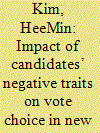| Srl | Item |
| 1 |
ID:
164382


|
|
|
|
|
| Summary/Abstract |
The impact of candidates’ negative traits (CNTs) on voting behavior has received significant attention in election studies in recent decades. However, scholarly efforts have focused primarily on elections in advanced Western democracies, largely overlooking the relationship between candidates’ personal traits and the electorate’s voting behaviors in the context of new democracies. In this study, we fill this gap by investigating the impact of CNTs on the electorate’s vote choices in South Korean presidential elections. Our study of CNTs in South Korea shows that CNTs have statistically significant effects on the electorate’s vote choices. Our findings are particularly relevant because many new democracies are implementing fair and free elections, and the elites under previous authoritarian regimes are running in these elections.
|
|
|
|
|
|
|
|
|
|
|
|
|
|
|
|
| 2 |
ID:
141189


|
|
|
|
|
| Summary/Abstract |
Idealized independent media function as “watchdogs.” Indeed, human rights nongovernmental organizations have argued that media freedom will improve human rights. This makes sense intuitively, yet recent formal and empirical studies show that the effect of independent media varies across regime types. We explore the relationship among media, government, and citizen protest movements and employ a game-theoretic model to investigate how the equilibria vary depending on regime type and media independence. In terms of equilibrium, we find that media watchdogging is most active in autocracies (and not in democracies), especially when the government’s perceived capability to repress public protest is declining. Uncertainty about the government’s ability to repress plays a central role in accounting for the manifestation of media watchdogging in conjunction with public protest. Illustrations from Tunisia and North Korea are provided to highlight equilibria derived from the formal model that vary as a product of perceptions about the government’s ability to repress.
|
|
|
|
|
|
|
|
|
|
|
|
|
|
|
|